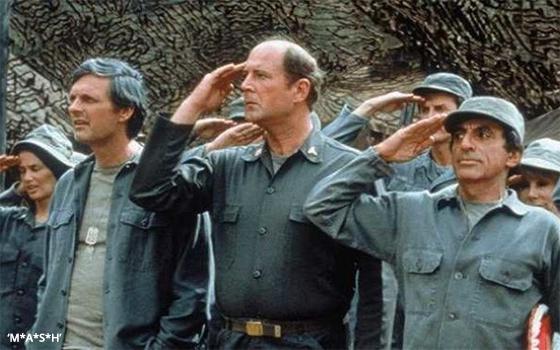
Can a single TV show “change
television”?
This claim is made every once in a while. Most recently, the subject arose in the commentary surrounding the death of Norman Lear earlier this month.
Did his TV shows -- “All in the Family,” “Maude,” “The Jeffersons,” “Good Times,” etc. -- change television? Some people
think so. It can certainly be argued that, yes, they did, at least for a while.
How about America at large? Did the tone and content of Lear’s shows
“change America” too? My own opinion is: Probably not. I just cannot give that much credit to a TV show.
Now, another TV show is being positioned
as a television-changer -- “M*A*S*H,” in a new two-hour documentary coming to Fox on New Year’s night, January 1.
advertisement
advertisement
The claim is made in the
very title of the show: “M*A*S*H: The Comedy That Changed Television.”
This raises the question: Can more than one show “change
television” in the same era? And if so, how?
The run of “M*A*S*H” from 1972 to 1983 on CBS
coincided with the run of “All in the Family” from 1971 to 1979, also on CBS.
The two-hour “M*A*S*H” documentary on Fox was years in
the making. This explains how the show can contain “new” interviews with some of the show’s participants who are now dead.
To their credit,
the producers -- John Scheinfeld (who also directed it) and Andy Kaplan -- got just about everybody, living or dead.
They are: Alan Alda (Capt. Benjamin
Franklin “Hawkeye” Pierce), Gary Burghoff (Cpl. Walter “Radar” O’Reilly), William Christopher (Father Francis Mulcahy), Jamie Farr (Cpl./Sgt. Maxwell Q. “Max”
Klinger), Mike Farrell (Capt. B.J. Hunnicutt), Wayne Rogers (Capt. “Trapper” John McIntyre), Loretta Swit (Maj. Margaret “Hot Lips” Houlihan), and executive producers Gene
Reynolds and Burt Metcalfe.
Wayne Rogers died in 2015, William Christopher in 2016, Gene Reynolds in 2020, and Burt Metcalfe in 2022.
To be fair, I have not yet watched the show. Fox provided access to a screener just this past Monday.
For all I know, the documentary makes a persuasive case for “M*A*S*H” as a TV agent of change.
And even if it
doesn’t, “M*A*S*H” was an important show anyway. It was very well-made and very popular.
The show’s two-and-a-half hour finale on February 28, 1983, drew an audience estimated by some at 125 million viewers. In the Nielsen currency of the time, the episode scored a 60.2
rating and a 77 share.
But after the “M*A*S*H”-mania came and went, TV resorted to what it had always done – namely, airing shows that
didn’t change anything.
By the following season -- 1983-84 -- the only sitcom in TV’s top 10 was “Kate and Allie”
(eighth).
The rest of the list was, in order: “Dallas, “60 Minutes,” “Dynasty,” “The A-Team,” “Simon &
Simon,” “Magnum, P.I.,” “Falcon Crest,” “Hotel” and “Cagney & Lacey.”
There were no
meaningful military comedies or family sitcoms centered on the social issues of the day. A “M*A*S*H” sequel, “AfterMASH,” came and
went.
Claims of these kinds of sweeping changes often strike me as hyperbolic, particularly in the titling of books.
Yesterday, I went in search of books with titles and subtitles suggesting that the books’ subjects “changed America,” sometimes “forever.” On the Barnes &
Noble web site, there were nine pages of them.
Some of the books can stake at least some claim to this assertion. These are the ones that cover events such
as the assassination of Abraham Lincoln, the Japanese attack on Pearl Harbor, 9/11, Jackie Robinson breaking baseball’s color line, and Prohibition (well, maybe).
But others really stretch the point. One book title posits that a relationship between U.S. Grant and Mark Twain was a “friendship that changed America.” Maybe it was. What do I
know?
Another book title says Hank Aaron’s home run record “changed America.” Another book avers that a little-known kidnapping in
Philadelphia in 1876 was “the kidnapping that changed America.”
The 1968 presidential election in which Nixon beat Humphrey was “the
election that changed America.” Other books about other presidential elections make the same claim.
Another book title was eye-catching. It was
“Mason Jar Nation: The Jars That Changed America.”
That sounds credible to me, for where would America be without Mason Jars?
“M*A*S*H: The Comedy That Changed Television” airs Monday, January 1, at 8 p.m. Eastern on Fox. “M*A*S*H” photo courtesy of MeTV.